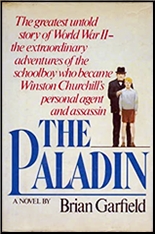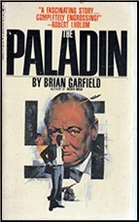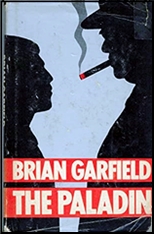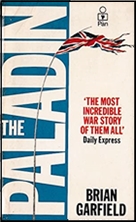Wed 26 Jan 2022
BRIAN GARFIELD – The Paladin. Simon & Schuster, hardcover, 1980. Bantam, paperback, 1981.

The book is based on his extraordinary story, but the book is a novel and it employs the sort of license that is customary in a work of fiction.
Some books either work or they don’t. They are so audacious in imagination and execution as to leave the reader with only two choices, go along with the game or throw his hands up in disgust and the book across the room.
In The Paladin veteran author Brian Garfield (The Last Hard Men, Hopscotch, Death Wish, Manifest Destiny, Wild Times among many others under multiple names) succeeds brilliantly in the first reaction. His idea and execution are so perfect, the idea so brilliantly brought off, that the reader is swept up in the imaginative details and left too stunned to protest.
The book opens as Englishman Christopher Creighton stands in London, 1965, like thousands of other Brits, as the procession of Sir Winston Churchill’s funeral winds its way through the streets of London past Whitehall and the Cenotaph. Like those thousands of others Creighton feels a great loss at the passing of the great man, but for Creighton it is personal, and that is the story Garfield proceeds to tell.
Christopher Creighton first met Winston Churchill before the war when Creighton was only ten and on an adventure and stumbled on Churchill painting. The year was 1936, the wilderness years when Churchill was out of favor, his career at its lowest ebb and his voice alone in decrying the Nazi menace in Europe.

A strange friendship develops between the two, Creighton, who Churchill calls, Christopher Robin and the older man the boy calls Tigger curiously drawn together. Creighton is fifteen when it occurs to Churchill that with the War having broken out there is something the boy can do, a mission involving a Belgian boy of the same age, something best done by a youngster.
With the success of that first mission and Creighton’s cleverness when it goes wrong, Churchill imagines there will be other opportunities for a boy good at languages and with a cool head, and Creighton is soon in training as a full fledged agent. Creighton will be involved in the assassination of French Admiral Darlan, Pearl Harbor, D-Day and other vital operations of the war, all quite reasonably told.
Absurd as it may seem Garfield sells it, and without the tongue in cheek play of Anthony Horowitz’s Alex Rider books about a latter day Christopher Creighton.
The book was a best seller, but more than that it created a sort of cottage industry, because Brian Garfield wasn’t the only one taken with the idea of Christopher Creighton’s career as Christopher Robin.
The Paladin was published in 1979, in 1987 Christopher Creighton turns up as the co-author of Noel Hynd’s The Khrushchev Directive dealing with the Soviet Prime Minister’s trip to the West and tying it to the mysterious disappearance of famed British diver and War hero Lionel Crabb V.C. (The Silent Enemy) who disappeared while diving beneath a Russian trawler in a British port on a probable mission for the British Security Services and suggests Lord Mountbatten’s 1979 assassination was not the work of Irish terrorists but related to his preventing the assassination of Khrushchev on his 1956 trip. In this one Creighton is an adult drawn back into international intrigue and adventure.

You would think that would be enough, but Christopher Creighton wasn’t done quite yet, in 1996 “Christopher Creighton†penned his own book, Op JB (“Operation James Bondâ€) purporting to be the true story of an operation by Ian Fleming to smuggle Martin Bormann out of Berlin under the noses of the Soviet’s under the orders of Churchill and Roosevelt in order to recover billions in Nazi loot. This one is presented as non-fiction replete with an index and photographs revealing Creighton was the really John Christopher Ainsworth-Davis, actor, writer, director, and musician.
A further book called The Mountbatten Report fell prey to authorial disputes with Ainsworth-Davis collaborators.
None of the books really acknowledge each other much though they share details , and whatever “truth†involved both the Garfield and Hynd books are strictly fictional in presentation while Op JB is presented as history but as far as I know uncorroborated. Certainly Simon and Schuster, the publisher, made no claims regarding the books authenticity and no American edition was ever published which is suggestive in itself. An epigraph, an alleged admonition from Winston Churchill to Creighton in the latter book warns, “Guard above all your reputation as a young man of no character; for if anyone should become proud of you — you are lost.â€
Creighton seems to have done an excellent job at that.

As literary gamesmanship goes this one is a fascinating case. Three works in three different decades by three different writers, two of them best sellers, and all purporting to be based on the memoirs of a figure who either has the best untold story of WW II or is the most inventive fictionneer since Baron Corvo.
All three books are well worth finding strictly as fiction of the playful historical kind. Since none of the people I would expect to be all over this sort of thing like Ben McIntyre, William Stevenson, or Jeremy Duns have deigned to write about it, I have my doubts though as might be expected there are some interesting side points that lend some probability to some of Creighton’s claims.
Then again, if true, it would still be almost impossible to prove short of some remarkable secret papers or diaries showing up.
Garfield said of his book:
Garfield could hardly have imagined he had started a mystery that would still be intriguing in the 21rst Century much less create a minor industry of books following where he led. Perhaps ironically Garfield wrote an expose a few years later on British soldier and diplomat Richard Meinhertzhagen whose exaggerated biography was told in John Lord’s Duty, Honour, Empire. Meinhertzhagen never saw the day his claims were as shrouded in mystery as those of Creighton/Ainsworth-Davis. History at least acknowledges Meinhertzhagen was there.
January 27th, 2022 at 12:22 pm
Garfield seemed to get excellent reviews for most of his work, but since he switched genres so much, not sure how much of a following he had. The Paladin does sound worth looking up.
January 27th, 2022 at 7:36 pm
It does sound like it would be a lot of fun — a book I’d never known about before.
January 28th, 2022 at 10:34 pm
THE PALADIN, MANIFEST DESTINY, and WILD TIMES were genuine best sellers (HOPSCOTCH came close and was made into an excellent film with Walter Matthau), the latter a mini-series with Sam Elliott (CBS I think). NY TIMES best seller status is a fair following for any writer.
I imagine after DEATH WISH his financial status was set. I’m not sure how many other films were based on his work, but I know THE LAST HARD MAN was filmed with Charlton Heston and James Coburn.
He also did a series of spy shorts for EQMM about Charlie Dark that were collected.
I don’t know that his mystery/suspense had as consistent a following as his Westerns, but in the latter half of his writing career he had major sales under his belt most genre writers would kill for.